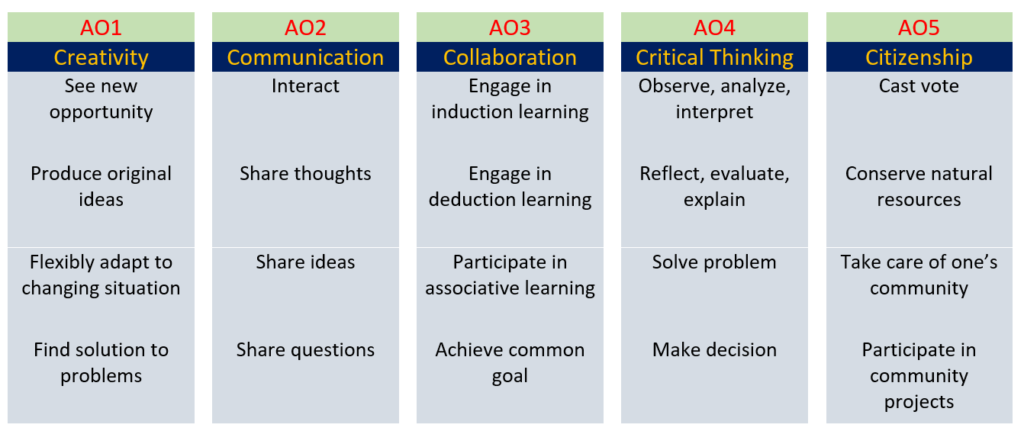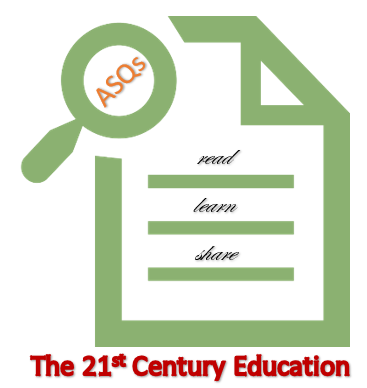
There are a range of English language Teacher Training programmes (TTP) around the world that prepare teachers for effectively teaching their English, but they lack the integration of 21st century competencies (TCC) in their syllabus. Time has come for ESL / EFL teachers to be familiarized with 21st century competencies and their ways of teaching them in class so that students can reflect them as post-graduation employable skills.
Thus, a typical TTP for TCC should outline a syllabus and an assessment criteria that enables the teachers of English to acquire not only the essential knowledge of the subject but also the TCC in alignment with the subject and familiarize with the principles of teaching the subject effectively in class. The syllabus should prepare the teachers for a range of practical skills for teaching English in a way that inculcates TCC in them besides demonstrating their ability to apply their TCC awareness in a real teaching context.
Accordingly, teachers who complete the TTP successfully may begin working in a variety of ESL / EFL teaching context anywhere. A typical syllabus for pre-service and in-service teachers may outline both the subject knowledge and the pedagogic knowledge in alignment with TCC required for any ESL / EFL teachers of today.

Course Syllabus Overview
The following may be viewed as a typical syllabus overview:

Assessment Overview
Next, TTP certificate should be awarded to teachers (or prospective teachers) who have completed the course and who have met the assessment criteria for all written and practical assignments. The assessment aims for each topic may include that teachers (or prospective teachers) should be able to:

Assessment Framework
TTP can be devised into two broad components i.e. component one and component two. Component one may outline planning and teaching related activities; whereas, component two may outline the demonstration classes.
Assessed internally, but externally moderated by the Ministry of Education (MoE) or Ministry of Higher Education (MoHE) approved assessor, who should sample portfolios and teaching practice and who should discuss and agree the grades for all the trainee teachers (also referred as participants). Wherein, the grades may be pass, merit and distinction and grade letters may be C, B & A respectively.
Course Description
Two decades of 21st century, when Web 4.0 heralded some key competencies that are widely known as “Five Cs” (i.e. creativity, critical thinking, communication, collaboration and citizenship) and vigorously adjudged as necessary for integration in all the academic syllabus. Wherein Creativity and Critical Thinking, which were earlier presumed to be quintessential skills, can be tutored, coached, and upskilled through a pedagogy-based syllabus. Whereas the remaining three Cs i.e. Communication, Collaboration and Citizenship should be viewed as fundamental life skills that learners need to press out in their every day experiences to acuminate their ability to live compatibly while connecting with others and working throughout their future. Accordingly, the Five Cs will not only strengthen the learners’ ability, compatibility and camaraderie but also accord them professionally, personally, and socially in the fast evolving 21st century while fostering other synergistic transmuting competencies, such as, Curiosity, Confidence, Caring and Cooperation.
Following the above advocation, this course may aim at providing teachers or teacher trainers with the knowledge, the mastery and the credence to assimilate these vivifying skills into their curriculum and teaching conditions. In a veracious teaching condition, the course participants can be expected to gain greater knowledge about what these competencies necessitate and not only how to teach them, but also how get the drift of their potential to create, to think critically, to communicate effectively, to collaborate successfully, and to connect as citizens.
Learning Outcomes
As learning outcomes, one may inadvertently list something similar to the following:
After attending the TTP course, participants will:
- gain a clear understanding of the creative process in pedagogy while getting an opportunity to live through the simulation of the same;
- think critically to solve problems in both the low and high resource environment of the information, media and technology;
- communicate not only ideas in the local vernacular and media code, but also in multicultural or multinational environment;
- collaborate in a group either locally, regionally or internationally to broaden opportunities of immersive learning, global citizenship, and common problem-solving;
- live, though within the set territory of the country the participant belongs to, beyond borders in taught, ideas, skills by sharing team spirit and collaboration.

Course Syllabus
| Topic 1 – 21st century learner and teachers and their teaching and learning contexts |
| 21st century information, technology and media backgrounds |
| Cultural, linguistic, and educational backgrounds |
| Motivations for teaching English as ESL / EFL to non-natives |
| English Language Teaching methodologies and preferences |
| English language learning and teaching in 21st century contexts |
| The varieties of English since 1550 |
| The role of the first language in 21st century multilingual paradigm |
| Topic 2 – 21st century language analysis and awareness |
| Basic concepts and terminology related to English language form and use in ELT discourse |
| Teaching of grammar, frameworks, rules and conventions |
| Teaching of lexis, word formation, and meaning in context |
| Teaching of Phonology, and features of speech |
| Key approaches for developing learners’ 21st century English language knowledge |
| Topic 3 – 21st century language skills (i.e. reading, listening, speaking and writing) |
| Basic concepts and terminology used for describing the language skills |
| Purposes of the language skills |
| Features and stages of the language skills |
| Potential barriers to developing the language skills |
| 21st century technology or media needs of the language skills |
| Strategies for developing learners’ receptive and productive skills using 21st century technology and media |
| Topic 4 – Planning and using resources for 21st century teaching contexts |
| Principles of planning for effective teaching of 21st century learners of English |
| Lesson planning for effective teaching of English using technology and media |
| Evaluation of lesson planning against the 21st century competencies |
| Selection, adaptation and evaluation of materials and resources in planning 21st century competency integrated assessment instruments |
| Topic 5 – Developing 21st century competency aware English language teachers and professionalism |
| The effective organization of the classroom with necessary technology and media support |
| Classroom presence (i.e. virtual and face-to-face) and control |
| 21st century teacher and learner language |
| The use of teaching materials and resources over technology and media |
| Practical skills for teaching English at a range of levels |
| The monitoring and evaluation of learning through portfolio |
| Maintaining professional development responsibilities |
Course duration
TTP may be designed to last a minimum of 120 contact hours including:
- the receptive and productive input hours
- the lesson planning and supervision hours
- the demonstration class hours
- the feedback on demonstration class hours
- the peer observation and evaluation hours
- the hours for observation of experienced / specialist teachers, and
- the consultation hours
Participants of TTP may be tasked to spend a minimum of 80 hours for the relevant reading, research with pre and post-demonstration task, assignments and lesson planning.
